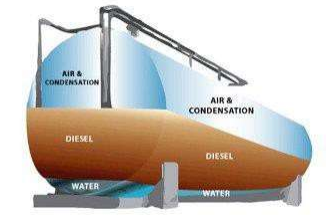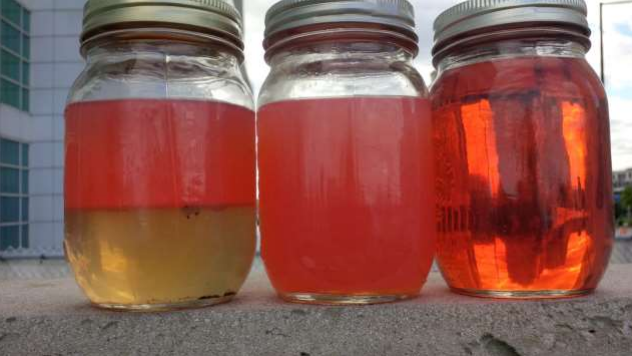Fuel Tank Maintenance
Is this a thing? Why is it needed?
Fuel tanks are present all around us. Your local PD has one, the city transit department has one and each gas station you visit to top off has a few. They currently represent the only way to store large amounts of gas/diesel until consumption.
One might think that being a simple tank full of gas/diesel, it doesn't need any maintenance since it's just a medium for storing liquid.
Wrong! Long term fuel storage has some effects on the fuels stored. Also the nature of the materials used to create the tanks indirectly affect the stored fuels.
Fuel tank maintenance is a vital necessity to successful fuel storage. It's needed to ensure that the fuel doesn't go "bad", making the investment in the stored amount go to waste. Secondly, also to ensure that "dirty fuel" which is contaminated, is not added to the fleet or to equipment. Consequently it may cause costly equipment damages and poor performance.
What happens to the fuel in the fuel tank?

Both gas and diesel experience the same issues when being stored in fuel tanks for medium-long term. Even when the fuel tank is emptied and refilled in a short term, a well known storage fact is that 3% of the tank volume never actually exchanges, that means about 120 gallons in a 4,000 gallon fuel tank per refill. This results in good, fresh fuel being mixed with older, stale "bad" fuel thus reducing overall performance. But that's not all.
Let's take diesel for example today:
Besides the fuel tank volume that never actually gets exchanged, diesel also can carry 0.01% by weight of water. That translates into an extra 10 gallons of water in the tank PER EACH refueling of the storage tank.
Also a fuel tank will never hold a 100% of its capacity all the time. This leaves a gap between the fuel and the tank wall where air is present. Consequently, due to temperature differences between the inside of the tank and the outside, condensation appears.
This adds ever more to the water surplus in the fuel tank. In addition it can enable forming of rust on the tank walls and microbial/algae formations in the fuel tank.
At a first glance, the fuel inside a tank can have its performance drastically reduced because of having stale fuel in the mix, water, rust or microbial/algae formations.
Can you imagine adding such a fuel to your car or equipment?
You use fuel from fuel tanks and never had a problem. How come?
This is where fuel tank maintenance kicks in. Together with these tanks come some serious filtering power given by fuel filters. These are designed to keep all the bad elements out of your fine tuned engine or equipment.
However fuel filters cannot take on all of the above mentioned and still generate satisfactory results. Fuel performance can be seriously degraded by the water or other formations in the tank, even if it's filtered. Also some elements will manage to escape the filter and end up in your fuel lines . Therefore causing issues or even worse, more complicated and costly problems, like permanently plugging or clogging fuel injectors.
Thankfully there is a way to make all these disappear and benefit from clean and "healthy" fuel. The right fuel additives are the secret weapon used in all fuel tank maintenance procedures and actually deliver outstanding results.

From left to right - Untreated fuel, during treatment, after treatment
One such quality fuel additive is CleanBoost® Maxx™. A fuel supplement and combustion catalyst that treats fuel and makes it more efficient by stabilizing it and adding lubricity. In a nutshell, it regenerates fuel to its initial intended state, helping remove harmful water condensates and other nasty elements. It is currently used in marine, shipping, power generation, mining, construction and ground transportation.
Unfortunately in today's market, you'll find that most fuel suppliers don't undergo this extra step in their fuel tank maintenance. They understand the issues, but solely depend on volume and the mere fact that most consumers of fuel are not savvy when it comes to fuel tank maintenance. It's also harder to 'prove' that a piece of equipment or vehicle problem was caused by bad fuel at one particular fuel source. It's better to save yourself some money and headaches by treating the fuel you use, yourself.
If your company has the duty of storing fuel, you should forward this article to the person in charge. Fuel tank maintenance is a real thing with real benefits as well as costly issues and problems if left untreated.
An additive such as CleanBoost® Maxx™ is super concentrated and will treat 30 gallons of gas/diesel per each 1 oz of additive. This will ensure that you get the most bang for your buck, with an increase in power and/or MPG to all end users. Also running cleaner fuels will reduce your emissions and maintenance to keep your car, truck, SUV, backhoe, snowblower, ATV, motorcycle, weedeater, generator, RV, boat, you name it, etc... if it burns fuel, it will run cleaner and more protected than without such a quality fuel additive. Get CleanBoost® Maxx™ today.
About the Author
Tech Guy
Automotive enthusiast, passionate about Jeeps, hot-rods, turbos, performance, efficiency, diesels, fuels, high performance oils, additives and anything with an engine.

